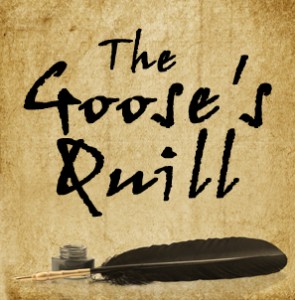As 2016 winds to a close, I take a look back and see what Goose’s Quill posts resonated with my readers the most. I often get surprised! Here are the top 20 of the year:
And my #1 read post of 2016:
Thank you everyone for reading The Goose’s Quill! Have a safe and Happy New Year, and I will see you in 2017!

Productivity: Checking in with 2016
Some of you may remember that at this time last year, I created a new work schedule to boost my productivity. So, how did it go? Let’s look at the numbers and find out.
I had some hope of hitting 500,000 words this year, but I fell short. My grand total was 417,914. Not bad at all. Now, I didn’t write all those words from scratch—those are how many words passed through my brain in some form or another this year.
I break my word count into 3 categories: Drafting (words from scratch), Revise/Rewrite (major reworking of already existing words), and Copyedit/Polish (nitty-gritty editing in the final stage of writing). The breakdown looked like this:
Not surprisingly, the Drafting was the lowest number (25.3%) since it takes the most time and effort. Revision/Rewrite (also a lot of thinking involved) came in at 27.1%. Copyediting/Proofreading (when the manuscript should be fairly clean) topped out at 47.5%.
Here’s what my monthly word totals came to:
You may recall that in August I bemoaned the low total for July. So you are probably wondering if I also lost my mind when I saw the abysmal 8,586 for December. No, I did not.
Part of my reason for not getting down on myself for December’s low productivity is that I had adjusted my expectations. The Thanksgiving-New Year’s timeframe is always a very hectic time, with lots of traveling, visiting, and special events to attend. Even hitting my monthly average of 35,000 words would have been unrealistic.
The other reason the number didn’t upset me was because I had a very important project that I simply could not quantify via word count. I finished a new book with my co-authors, and by December it was ready to be sent to agents. So I spent a great deal of time in December researching agents. Once I compiled a list of 50, I put together the query letters and their accompanying pages/synopses.
So, I begin 2017 content that my work schedule has increased my productivity, and hopeful that the queries I send out in January will move my career ahead by getting me an agent.
Have you re-evaluated your current work routine? Is it still working for you? Will you be making changes in 2017?
Save